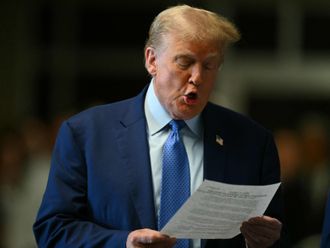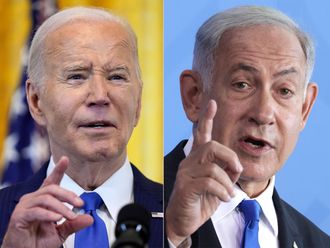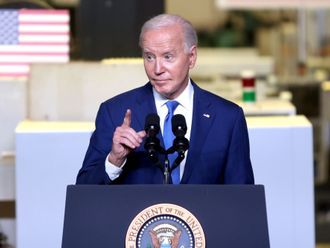ISLAMABAD: Pakistan’s prime minister pledged his country’s cooperation in fighting militants during talks on Tuesday with Secretary of State Rex Tillerson, who has insisted Pakistan do more to curb support for terrorist groups or face US reprisals.
“The US can rest assured that we are strategic partners in the war against terror and that today, Pakistan is fighting the largest war in the world against terror,” Prime Minister Shahid Khaqan Abbasi told Tillerson just before their closed-door talks began. Pakistan’s army and intelligence chiefs also attended the meeting.
Moments earlier, Tillerson alluded to US concerns that Pakistan is providing safe haven to terrorist groups — a charge Pakistan has repeatedly denied. At the same time, he described Pakistan as having an “important role” in the Trump administration’s strategy and referenced “our joint goals of providing peace and security to the region and providing opportunity for greater economic relationship.”
On Monday, during a brief and unannounced visit to Afghanistan, Tillerson struck a much harsher tone, saying he intended to make clear in his talks Tuesday that Pakistan’s relationship with the United States will suffer — including possible aid cuts — if it does not take specific actions to curb support for militant groups, including the Haqqani network, a Taliban affiliate.
Tillerson’s arrival in Pakistan was low-key and heavily secured; he landed at a military airbase in nearby Rawalpindi city at midafternoon with little official protocol or fanfare, and his only visits were to the US. Embassy and the prime minister’s office in Islamabad. Traffic was blocked across the capital during the official convoy’s movements.
Pakistan’s Senate chairman, Raza Rabbani, said Tuesday that Tillerson’s threatening message the day before “seems like that of a viceroy’s before they visit a country.”
Abbasi, though, appeared eager to assure Tillerson he had heard the message, telling him when they met Tuesday that Pakistan’s government is committed to the war against terrorism. “We have produced results,” he said. “And we are looking forward to moving ahead with the US and building a tremendous relationship.”
Despite the largely cordial tone of their opening remarks, followed by several hours of private talks in the prime minister’s office before Tillerson flew to India for a longer stay, the enormous gap between American and Pakistani concerns and priorities has been evident in comments made by numerous Pakistani officials and opinion makers in the past week.
The Trump administration has focused strictly on the demand for more Pakistani cooperation in curbing terrorism and in ending the 16-year conflict in next-door Afghanistan. Many Afghans view Pakistan — which once backed the Taliban regime in Kabul — as a source of violent Islamist militancy and a permanent threat to their country’s stability.
Pakistanis, on the other hand, are far more worried about the threat from India, its larger rival and neighbour to the west.
Pakistani Defence Minister Khurram Dastgir, who participated in the talks with Tillerson, told a TV news show Tuesday night that “we told him the threat of India is very real” and that Pakistan wants “mutual respect and cooperation,” not economic aid, from Washington.
Dastgir said a single meeting was held with Tillerson, including senior civilian and military officials, “to give a united message” to Washington. Pakistan’s military establishment cooperates with US intelligence agencies on terrorism issues but has bristled at suggestions from civilian leaders that it would allow US troops to operate in Pakistan.
Defence Secretary Jim Mattis is due to visit Pakistan soon and is expected to reinforce Tillerson’s demands; he has told Congress several times that Pakistan is still sheltering the Haqqani network despite its denials. There has been no specific description of likely sanctions on Pakistan if administration officials decide they are not satisfied.












